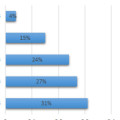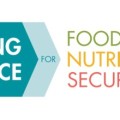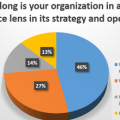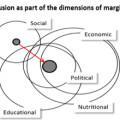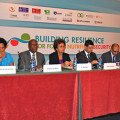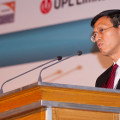Households in developing countries rely on a variety of strategies to cope with shocks. While the importance of social safety nets in protecting impoverished households is widely accepted, the role of gender, in underlying vulnerabilities and response to shocks, remains largely ignored. In their 2020 Conference Brief Gender, Shocks, and Resilience, IFPRI’s Neha Kumar and >> Read more
Knowledge Fair Participant Poll: Day 3 Results
1. If you had $1 million to allocate to only one resilience capacity-building activity, which of these would you try to improve? 2. In your opinion, will the world be more resilient to shocks by the year 2020?
The way forward for building resilience for ending hunger and malnutrition
Resilience is much more than the latest buzzword in development. It has real and practical meaning and application in our work, and will play a key role in bridging the divide between short-term relief and long-term development goals. In his closing remarks IFPRI Director General Shenggen Fan shared lessons learned from the conference and >> Read more
Highlights from Conference Brief 2: Enhancing resilience for food security in refugee-hosting communities
In 2012, the world was home to about 28 million people who had fled their home region or country, and most of these people were hosted in developing countries. These refugees and internally displaced people (IDPs) have tended to be the focus of publicity and relief efforts—but what happens to the resilience and food security >> Read more
Highlights from Conference Brief 9: Pastoralism and Resilience South of the Sahara
Pastoralists in the Horn of Africa face five big challenges to their resilience: They are losing land to farmers, irrigation, tourism, and land investments by outside investors. Conflict and violence have disrupted livelihoods and markets and increased vulnerability during drought. Population growth has put heavy pressure on land resources. Among pastoralists, there are large differences >> Read more
Knowledge Fair Participant Poll: Day 2 Results
1. Is resilience a useful concept or just a buzzword in development? (Yes= resilience is useful concept; No= resilience is buzzword) 2. How far along is your organization in adopting a resilience lens in its strategy and operation?
Highlights from Conference Brief 15- “Resilience and Exclusion: Development Policy Implications”
A new conference brief by Joachim von Braun and Sukhadeo Thorat makes the case that overcoming exclusion is a complex political agenda with legal, cultural, social, economic, technological, and governance dimensions. Exclusion is a global phenomenon, not just one of developing countries, the authors note, and is fundamentally a human rights issue. Exclusion quite often erodes the resilience capacity of social groups. It brings about unequal access to public services, making excluded people’s efforts to overcome shocks more difficult than those of their counterparts from nonexcluded groups. Moreover, resilience and exclusion are in a vicious dynamic relationship over time. Typically, social exclusion perpetuates the effects of shocks and thereby undermines resilience. The socially excluded groups may collapse or converge to a worse-off steady state after disruptions, taking a protracted time to recover from shocks.
Pacific and Caribbean voices echo at global resilience conference
A delegation of private sector, civil agencies and government sector actors from Asia and the Pacific took the stage at an opening side event at the IFPRI organized conference on "Building Resilience for Food and Nutrition Security." To a person, the panelists expressed a strong wish to have their voices heard loud and wide.
The session titled "Enhancing Resilience for Food and Nutrition Security in Small-islands Economies" was organized by the Technical Centre of Rural and Agricultural Co-operation (CTA) and aimed to outline the unique challenges faced by small-island developing states (SIDS) throughout the region in addition to opportunities for enhancing resilience throughout the region.
Their representation was a welcome addition to the latest addition of the IFPRI 2020 Conference series, the sixth of its kind.
“Each of the conferences builds on including more actors,” says Rajul Pandya-Lorch, Head of IFPRI's 2020 Vision and lead organizer behind the conference. “We saw that with the South Asia conference where this time when we announced this conference, we got an immediate phone call from South Asia with an organization wanting to run a side event.
“That’s why CTA with their experience and networks are so important. And we would hope to amplify that participation at the next conference.”
Building a green and resilient economy in Ethiopia
“For us, anticipating, adapting to, and recovering from shocks are essential to our future.” With those words, H. E. Hailemariam Dessalegn, Prime Minister of Ethiopia, highlighted the importance of resilience for his country. In his inaugural address at the opening of the 2020 Conference on “Building Resilience for Food and Nutrition Security” Thursday evening, >> Read more
Strengthened resilience can help end hunger
Shocks, whether man-made or natural in origin, are a fact of life for citizens of both the developed and developing world. Building resilience in the face of growing threats such as extreme weather events, rising and highly volatile food prices, and the effects of global climate change is more important than ever. If we are >> Read more

